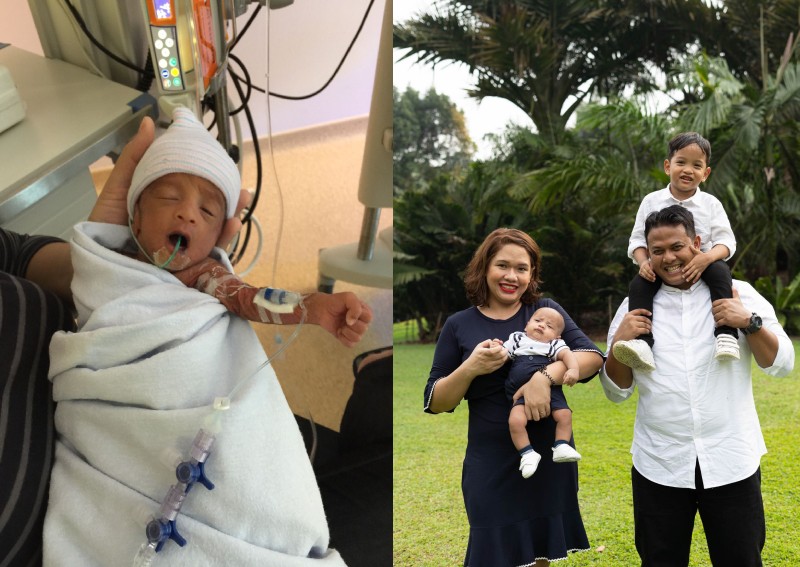Self-doubt and guilt: Mum gives birth to palm-sized premature baby but 'won't have it any other way'


 PUBLISHED ONNovember 23, 2021 9:10 AMBYChing Shi Jie
PUBLISHED ONNovember 23, 2021 9:10 AMBYChing Shi JieThis first thing this mother noticed about her newborn son was how small his legs were.
Nur Fadhillah remembers the day she saw him — five days after he was born on April 3, 2015 at KK Women's and Children's Hospital's (KKH) neonatal intensive care unit (NICU).
“I was prepared that Matiin wouldn’t look like a normal chubby baby.
"But I remember feeling shocked at how his thighs were literally like the index and middle finger [pressed] together,” the 36-year-old civil servant told AsiaOne.
For most mothers, a full-term pregnancy is considered to be at least 37 weeks. For Fadhillah, however, her son was born premature at 30 weeks.
"There were two big tubes going through his nose that covered three-quarters of his head. And the smallest diaper he was wearing went up to his chest because he was so tiny," she added.
Seeing a newborn son lying in an incubator while relying on life support would have broken the hearts of most first-time mothers. Fadhillah, though, resisted crying in front of the baby, who weighed at 1.2kg then — less than a bag of rice.
One doctor advised her — as difficult as it sounds she said — to cry outside the room as babies are able to sense what others feel but do not know that they are sick. She added: "So if we cry, all he [Matiin] will sense is sadness, fear and uncertainty.
"I spoke to my husband and there was a pact between me and him. Whenever we go into the NICU room, we'll be the two happiest idiots there."

With prematurity on the rise, Matiin is one of the 15 million babies — or one in 10 — that are born premature worldwide according to World Health Organisation estimates. According to the Ministry of Health, about 3,500 babies, or one in 11, were born premature in 2017.
The more premature the babies are, the more health complications they are likely to have later in life. According to the University of Utah, a baby born before 24 weeks has less than 50 per cent chance at survival.
Having experienced delivering a premature baby, Fadhillah is a member of KKH's The Early Bird Baby Club. Formed in 1997, this support group consist of parents who have had premature babies and a team of volunteer nurses, neonatologists, medical social workers and allied health professionals from the hospital's Department of Neonatology.
Speaking to AsiaOne, Fadhillah, now a mother of two, said the club will be meeting online on Nov 25 through Zoom to commemorate the yearly Prematurity Awareness Month. World Prematurity Day falls on Nov 17.
Besides coming together to share their experiences of having a 'preemie' child, Fadhillah added that she is using the occasion to pay tribute to the healthcare professionals at KKH who guided her through all the "fears and anxieties" of giving birth to Matiin six years ago.
"I remembered the kindness, grace, comfort and care they showed my son in the six weeks he was there. It's something I'll never forget," she said.
Fadhillah felt she had a "normal and uneventful pregnancy" until the 29th week, when she began experiencing severe back pains.
After admitting to KKH, doctors at the labour ward told her that the symptoms were expected "given that the baby is turning".
But overnight, her blood pressure was at 180, way over the 'healthy' reading of less than 120/80 mmHg.
While she, who had suffered a miscarriage earlier, was kept at the hospital as a precautionary measure, her seaman husband Ifwalmi Nasution, 36, was working in Egypt for the past seven months.
She said: "They [the doctors] gave me all sorts of medication to bring the blood pressure down, but it kept going up. After a detailed scan, they told me that I might have to deliver the baby early.
"I remember telling my husband 'I'm still feeling fine and that you don't have to come back home'. I thought I would be discharged soon."
When he returned to Singapore — to be by her side during her 30th week of pregnancy — doctors told the couple that they had to perform an emergency caesarean to deliver the baby.
"I didn't get to see Matiin the moment he was born. It was dead silence and I didn't hear any cries from him. I kept asking if the baby was okay. The doctors told me that he's out but they'll have to bring him to the NICU since he's small," she said.
"My husband got to see the moment he left the operation theatre. He said the baby was wrapped in plastic and he was the size of my palm, from head to toe."
Fadhillah was kept in the High Dependency Unit due to the risk of eclampsia, a rare but severe condition where a patient suffers seizures caused by high blood pressure during pregnancy.
Describing how Matiin's health was the only thing on her mind, she said: "Whenever I asked the doctors questions like, 'Is he going to survive?' 'Will there be any lasting effects (of his premature birth)?' Their answers are always 'Let's take it one day at a time."
[[nid:539695]]
After five days in the High Dependency Unit, Fadhillah was well enough to see her son at the NICU. She remembers feeling guilty for 'causing' her son to be born premature.
"There was a lot of self-blaming that went on for the first year of his life. I kept thinking about how I was working too much throughout the pregnancy and maybe that's why my blood pressure went up at the hospital," she said.
"It took a lot of convincing from the doctors and social workers to tell me that even though [a premature birth] is rare, it does happen sometimes and there's no leading reason for that," she added.
Despite the continued self-doubts, she began to devote all her time and energy into learning how to raise a premature baby.
Seeing it as a "task to focus on", she befriended other parents at the KKH The Early Bird Baby Club and participated in various classes in the hospital. These include infant CPR (cardiopulmonary resuscitation), learning how to change the feeding tubes and how to shower a 'preemie' baby.
"I was discharged after seven days but I was in KKH everyday for the next six weeks as Matiin is still hospitalised there. I can probably walk around with my eyes closed since I'm so familiar with the place," she said.

Six years later, it is hard to imagine that Matiin was born premature. Weighing at 30kg, he is among the biggest in his kindergarten class. Fadhillah explains that she has never hidden from him that "he was too eager to see the world".
She said: "When he brought his baby photos to school, he wondered why he was wrapped in plastic and with tubes all over [his body]. I told him he was born too small and was the chosen one.
"He doesn't know the repercussions of being born premature but I'll definitely explain it to him when he gets older. Right now, he thinks it's a special thing and let's keep it that way."
Reflecting on her time in KKH, Fadhillah, who gave birth to another child in February 2019, feels that the experience with Matiin was "meant to be".
"I wouldn't have it any other way. I know it's odd to say this, who wouldn't want to have a normal pregnancy? But if you ask me, Matiin was meant to go through this.
"And as a first-time mother, it made me more prepared for my second one. It gave me more training since KKH really took care of the mothers and their premature babies.
"I'm thankful I went through that and how [there's] no lasting impact on Matiin and he's pretty much growing up normal now."
ALSO READ: True story: My child weighed just 850g, born prematurely at 26 weeks - and is a healthy teen now